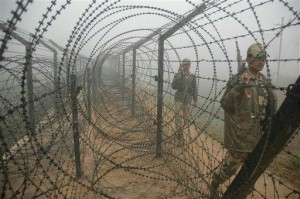 The New Republic article, “Will Climate Change Lead to Mass Immigration from Mexico?,” is timely, given the prominence in the news of Arizona’s immigration law. The migration that will follow climate change is certainly an issue that should be kept in the public’s awareness.
The New Republic article, “Will Climate Change Lead to Mass Immigration from Mexico?,” is timely, given the prominence in the news of Arizona’s immigration law. The migration that will follow climate change is certainly an issue that should be kept in the public’s awareness.
The author, Bradford Plumer, points out that most climate-change induced migration will happen within developing countries – country folks from villages will move to urban centers. Historically this is nothing new.
Migration from one country to another is harder to predict. A powerful symbol of what to expect is the fence along the 2,500 mile border between India and Bangladesh. The majority of land in Bangladesh is less than 20 feet above sea level. By the end of the century, more than a quarter of the country will be under water. The fence will prevent migration to India.
Right-wing seeks common cause with environmentalists
Plumer points out that, in Europe, right-wing nativist groups – like the British National Party (BNP), which restricts membership to “indigenous Caucasians” – would like to join forces with green, environmentalist parties.
A lot of [the BNP] rant on about how immigration is terrible for the environment, since a person’s carbon footprint swells when he or she moves from a poor country to a rich country. Similarly, in France, Jean-Marie Le Pen’s National Front has started hitting on environmental themes of late. Few actual environmentalists want anything to do with these parties, and there doesn’t seem to be anything comparable in the United States, though if global warming does put pressure on immigration, it’s certainly possible that green nativists could find a toehold here.
For more on the upcoming migrations in response to climate change, see this Scientific American article, “Climate Change Makes Refugees in Bangladesh.”
New Republic articles on energy and the environment (The Vine) are available by email or RSS feed.
Related posts:
A financial expert argues: Global warming is real
Scientists confront political attacks on climate change
Climate crisis. Health crisis. Same difference.
Resources:
Image source: Cryptome
Bradford Plumer, Will Climate Change Lead to Mass Immigration from Mexico?, The New Republic, July 27, 2010
Lisa Friedman, Climate Change Makes Refugees in Bangladesh, Scientific American, March 3, 2009


Thank you for your comment, Anne. I had forgotten about this post. And thank you for pointing out the distinction. I just looked this up on Wikipedia (http://en.wikipedia.org/wiki/Environmental_migrant). Seems to me the distinction between migrant and refugee will have political implications. Refugees has a stronger sense of not having any choice, and therefore liberal governments should be willing to support their plight. Unfortunately, there is too much anti-immigration sentiment in the developed world and it becomes a political platform for conservatives.
I’m interested in the implications of climate change for health. I’m surprised the subject doesn’t get more publicity (given the way the media loves scary stories). There are occasional articles on the expanding territory of disease vectors, but I guess so far it’s primarily poorer countries that are affected by this, so it doesn’t get much attention in first world countries. I was hoping the medical profession would get behind this issue, but I guess they have too many other things on their minds.